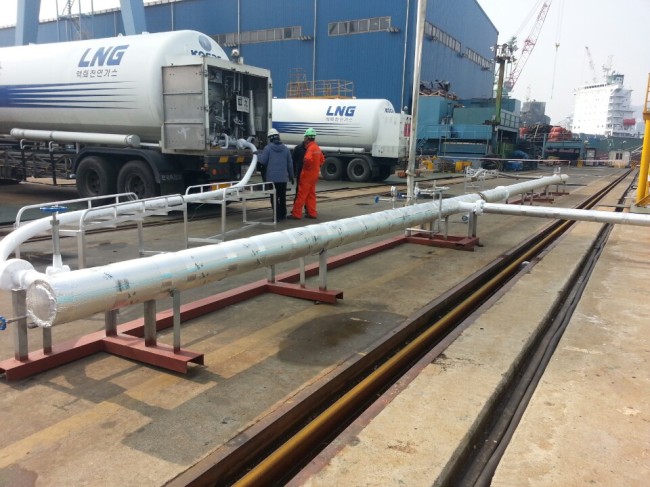Korea Gas Corporation, a public natural gas company, said Sunday it is aiming to take the lead in liquefied natural gas bunkering by naming it a new strategic business in response to the nation’s move to foster eco-friendly energy business.
LNG bunkering, which uses LNG as vessel fuel, is emerging as an eco-friendly business in response to the government’s regulations on marine environment.
LNG bunkering, which uses LNG as vessel fuel, is emerging as an eco-friendly business in response to the government’s regulations on marine environment.

“We will expand the supply of natural gas through our LNG bunkering business and will also try to make legal grounds for the use of LNG vessel fuel by the end of 2019,” said a spokesperson of Korea Gas Corporation.
The agency also plans to cooperate with international bunkering companies, including Shell and Mitsui.
It is participating in the standardization of LNG bunkering facilities and procedure being pushed by the Society for Gas as a Marine Fuel, an international non-governmental organization.
LNG is known as green fuel as it can reduce the emissions of sulfur oxides by 100 percent, nitrogen oxide by 15 to 80 percent and carbon dioxide by 25 percent compared to existing fuels for vessels, according to NYK-Line, one of the largest shipping companies in Japan.
According to the latest research done by the Korea Maritime Institute, the pollutants emitted from vessels are in the critical level. One container vessel is estimated to emit the same amount of sulfur oxide as 50 million diesel cars and as much fine particulate matter as 500,000 trucks.
Out of the total sulfur oxide and fine particulate matter emitted in Busan, the nation’s largest port city, the pollutants emitted from vessels account for around 73 percent and 51 percent respectively, according to the government agency.
In Korea, the Moon Jae-in administration is pushing for policies to reduce the emission of fine dust by 30 percent within his tenure.
The government is currently reviewing to make the Port of Busan and the Port of Ulsan as bases for bunkering infrastructure. By 2025, around 600 billion won ($550 million) will be injected to make the Port of Busan a base for LNG bunkering in Northeast Asia. As to the Port of Ulsan, a marine floating bunkering terminal will be established to strengthen the function of energy logistics.
The demand for the eco-friendly LNG bunkering is also expected to rise in the future. By 2030, the demand for LNG bunkering in the global market is estimated to reach 20 to 30 million tons per year, according to the Korea Gas Corporation. Lloyd’s Register predicted that around 1,962 LNG vessels will be constructed by 2025, accounting for 12.6 percent of the total vessels built.
By Shin Ji-hye (shinjh@heraldcorp.com)


















![[KH Explains] Hyundai's full hybrid edge to pay off amid slow transition to pure EVs](http://res.heraldm.com/phpwas/restmb_idxmake.php?idx=652&simg=/content/image/2024/04/18/20240418050645_0.jpg&u=20240418181020)

![[Today’s K-pop] Zico drops snippet of collaboration with Jennie](http://res.heraldm.com/phpwas/restmb_idxmake.php?idx=642&simg=/content/image/2024/04/18/20240418050702_0.jpg&u=)